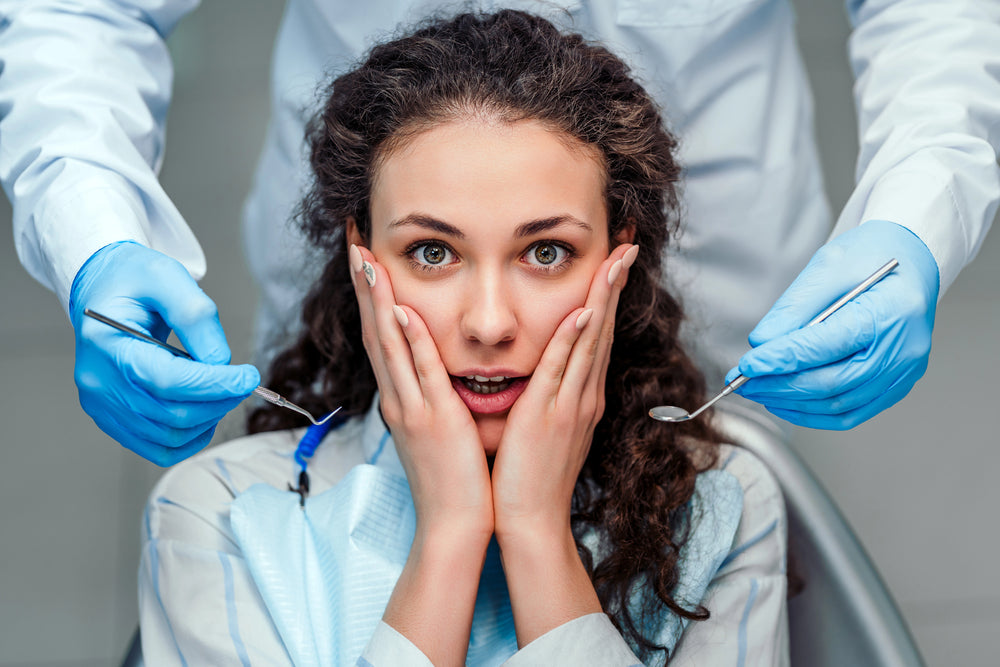
What is Dentophobia Dental Anxiety?
|
Time to read 4 min
|
Time to read 4 min
A phobia can be described as a kind of anxiety disorder that can cause intense, unfounded fear of an event, living thing, place or even an object.
Some people have dentophobia when a person suffers from this particular fear of visiting the dentist or even going to the dentist. Dentophobia can be the cause of Previous negative experiences, such as family histories or uncontrollable feelings that can result in dental fear.
Sometimes referred to as Odontophobia. Seeing dental instruments (scaler, drill, forceps) can trigger dental fear.
If you don’t have any idea about this phobia? Here we will discuss DENTOPHOBIA VS DENTAL ANXIETY , its causes and more.
Phobias are an anxiety-related disorder. They can cause excessive fear about the event or circumstance, which isn't really harmful.
Dentophobia is one of the types of phobia that is specific to an event (going into the dental office) and causes an anxious response.
Dental phobia can cause by:
Previous Experiences
The main reason for the majority of phobias, including dentophobia generally, is that they're caused by a prior painful incident. It is the reason that most behavioural psychologists have agreed on. If the patient has an experience in the past that is particularly unpleasant, stress levels and anxiety may get higher, particularly when the patient suffered a terrible experience on the first visit to the dentist. Any subsequent trips could become unnecessarily stressful mentally.
Genetics
At first glance, it's unlikely to think that being nervous about dentists probing the gums of your mouth could be inherited. It is accepted within the medical world that an earlier disposition could be handed down through genetic inheritance from parents. Family members that are believed to be afflicted by other phobias or are prone to anxiety, in general, can affect a person's mental stability. It's important to recognize that anxiety disorders may originate from multiple factors. This includes the environment, prior injuries as well as genetics.
Discover More: Dental Myths And Facts–Find Out More
Fear of visiting the dentist could lead to dental problems that can become worse and need more urgent treatments or more complicated procedures. The condition can further feed the root cause of anxiety about dental visits. It is referred to as the 'vicious circle of anxiety' over the teeth.
Regular check-ups of the dental system, cleanings as well as X-rays for the teeth are a great way to prevent the development of dental diseases and aid the dentist in identifying issues early so that less complicated and less intrusive treatment options are required.
Regular visits to dentists will help to diagnose any signs of oral cancer and mouth cancer , which is particularly crucial for people with a history of oral cancer. This is especially important for those who e-liquids or drink alcohol on a regular basis, and more especially for people who have both.
Common dental problems are caused by lifestyle and are preventable. When you avoid visiting the dentist in the first place, you're not just more likely to require advanced treatments once you finally visit the dentist, but you're being deprived of learning you can better take care of your dental health.
Therefore, maintaining a good oral routine with our products and making sure to floss your teeth at least twice per day is vital.
You can manage dental anxiety by taking these steps:
Effective bad breath remedies include:
Gentle and regular scraping of the tongue
Regular oral care practices such as daily brushing and flossing
Professional deep cleanings and plaque removal
The ongoing use of oral probiotics.
One, the probiotics compete with the existing bad bacteria and reduce their presence by “crowding them out”
Two, the probiotics produce BLIS or “bacteriocin-like-inhibitory-substances” which is a technical way of stating that one probiotic strain (bacteria) can produce a substance that inhibits or kills off other bacteria. Three, by working to control gingivitis, gum disease and tooth decay these probiotics reduce the very sources of bacteria-generated odors in the mouth.
Studies have shown a clear reduction in plaque levels and gingivitis symptoms when oral probiotics were administered to patients with moderate to severe gingivitis.


